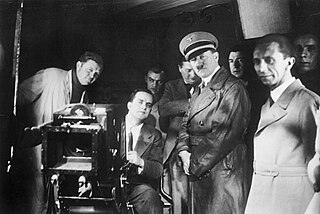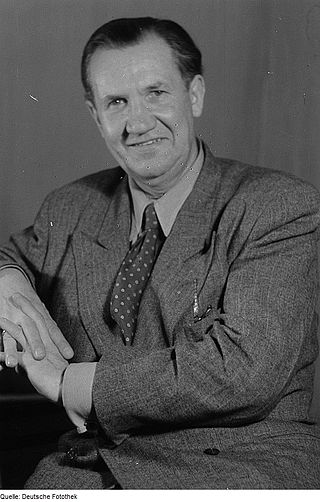
Henry Koster was a German-born film director. He was the husband of actress Peggy Moran.

Nazism made extensive use of the cinema throughout its history. Though it was a relatively new technology, the Nazi Party established a film department soon after it rose to power in Germany. Both Adolf Hitler and his propaganda minister Joseph Goebbels used the many Nazi films to promote the party ideology and show their influence in the burgeoning art form, which was an object of personal fascination for Hitler. The Nazis valued film as a propaganda instrument of enormous power, courting the masses by means of slogans that were aimed directly at the instincts and emotions of the people. The Department of Film also used the economic power of German moviegoers to influence the international film market. This resulted in almost all Hollywood producers censoring films critical of Nazism during the 1930s, as well as showing news shorts produced by the Nazis in American theaters.

Irving Pichel was an American actor and film director, who won acclaim both as an actor and director in his Hollywood career.

Willi Forst, born Wilhelm Anton Frohs was an Austrian actor, screenwriter, film director, film producer and singer. As a debonair actor he was a darling of the German-speaking film audiences, as a director, one of the most significant makers of the Viennese period musical melodramas and comedies of the 1930s known as Wiener Filme. From the mid-1930s he also recorded many records, largely of sentimental Viennese songs, for the Odeon Records label owned by Carl Lindström AG.

Carl August Hugo Froelich was a German film pioneer and film director. He was born and died in Berlin.

Karl Hartl was an Austrian film director.
Arnold Pressburger was an Austrian Jewish film producer who produced more than 70 films between 1913 and 1951. Pressburger was born in Pressburg, Austria-Hungary and died in Hamburg, Germany from a stroke.
Seymour Nebenzal was an American-born Jewish-German film producer. He produced 46 films between 1927 and 1961.

Fritz Kampers was a German film actor. He appeared in more than 250 films between 1913 and 1950.

Lothar Mendes was a German-born screenwriter and film director. His two best known films are Jew Süss (1934) and The Man Who Could Work Miracles (1936), both productions for British studios.
Hans May was an Austrian-born composer who went into exile in Britain in 1936 after the Nazis came to power in his homeland, being of Jewish descent.
Operetta films are a genre of musical films associated with, but not exclusive to, German language cinema. The genre began in the late 1920s, but its roots stretch back into the tradition of nineteenth century Viennese operettas.
Gregor Rabinovitch was a Ukrainian-born film producer who worked for many years in the German film industry. He emigrated to France from the Soviet Union in the early 1920s. After working for a time in Germany, he left following the Nazi takeover of power in 1933, and spent a number of years in France and the United States. He later returned and died in Munich in 1953.
Nero-Film AG was a German film production company founded in 1925 and based in Berlin during the Weimar era.
Robert Baberske was a German cinematographer. Although he worked briefly in Britain, Baberske spent most of his career in the German film industry. Baberske began as an assistant to Karl Freund. He became a prominent film technician during the silent era, and later during the Nazi years. Following the Second World War, he lived and worked in East Germany on a number of propaganda films for the state-controlled DEFA studio.
Jacek Rotmil (1888–1944) was a Russian-born art director and production designer who worked on 100 films during his career Following the First World War, Rotmil entered the booming German film industry and worked prolifically until 1933. Following the Nazi rise to power, Rotmil went into exile in Poland where he was employed frequently on Polish and Yiddish productions. He had first become involved in the Polish film industry in 1930 when working on the sound version of the Polish film Exile to Siberia in Berlin.
Hans Wilhelm was a German screenwriter. Wilhelm was of Jewish heritage, and was forced to emigrate following the Nazi takeover in 1933. After going into exile he worked in a variety of countries including Britain, France, and Turkey before eventually settling in the United States. He later returned to work in West Germany following the Second World War.

The Società Italiana Cines is a film company specializing in production and distribution of films. The company was founded on 1 April 1906.

Gabriel Levy was a German film producer who was associated with the company Aafa-Film during the 1920s and 1930s. Following the Nazi takeover of power in 1933, Levy, a Jew, lost control of the company and was forced into exile in the Netherlands.
Reimar Kuntze was a German cinematographer. He worked on more than 100 film productions during his career.









